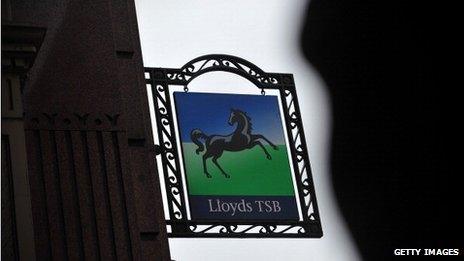Lloyds privatisation begins
- Published
- comments

So more or less on the anniversary of the collapse of Lehman Bros, which triggered the mother of all banking crises, the Treasury has begun the privatisation of one of the enormous banks rescued by taxpayers in the autumn of 2008.
Tonight the government is trying to sell 6% of Lloyds for around £3.3bn - which represents a bit under a sixth of our 39% stake in the bank.
Based on tonight's market price of Lloyds, of just over 77p, the Treasury should get back more or less the cash invested by taxpayers in Lloyds - which was 73.6p per share.
During the eurozone banking crisis of 2011-12, getting our money back looked an impossibility.
That said, we won't make a fat profit. And the National Audit Office will point out that when the cost of money is taken into account, taxpayers will make a loss.
There is one other important financial characteristic of this deal for the chancellor: it will show a "book" profit to the government of around £600m and will reduce the national debt by that amount.
The notional profit stems from what some would see as the eccentricities of how the government accounts are written, namely that the shares were included in the government books not at their cash price, but at the (lower) market price on the day of the purchase of shares being a legal reality.
However, for Lloyds, the big point is that it moves nearer to being back in the private sector. And even in this initial sale, many will say taxpayers will get their money back (at least in cash terms).
PS: These shares are all being offered to investment institutions. The next sale of Lloyds stock will also include an element aimed at retail investors.
UPDATE 20:35
My hunch is that the Treasury is likely to receive around 75p per share for the 6% of Lloyds it is selling - a small discount to the closing market price of 77.3p, and a slight premium to the cash price paid by taxpayers for the stake in 2008 and 2009.
Around 80% to 90% of the shares are likely to end up in the hands of British and American investment institutions, in a sale being conducted for the government by JP Morgan, UBS and Bank of America.
The potential buyers of the shares are being given a promise by the Treasury that it won't sell any more Lloyds shares for at least 90 days. Which means that part two of this privatisation cannot happen till the end of the year, at the very earliest.
As for when individuals can be expected to be offered shares in a retail offering comparable to Margaret Thatcher's "Tell Sid" privatisations, that cannot happen till after Lloyds publishes its annual report for 2013, to allow for the writing of a proper prospectus.
The annual report won't be available till February. Which implies that a share sale to millions of people can't and won't happen till some months into the new year, at the earliest.